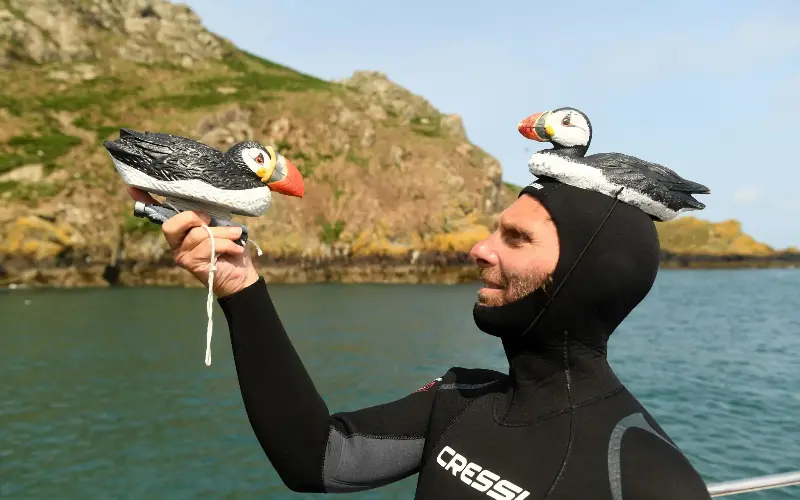
It’s 7.45am in west Pembrokeshire and an impromptu convoy is snaking down a back road to nowhere. Delivery drivers scowl in passing places as cars stream past. We’re en route – that’s me and eight other cars – to Martin’s Haven.
More precisely, we’re en route to Skomer Island nature reserve to experience the largest puffin colony in southern Britain.
In late-May The Wildlife Trust of South and West Wales counted 43,626 puffins on Skomer, a new record.
How could it be so precise? “The island is broken into seven sections and we systematically count every bird: on land, rafting on the sea and estimate the number in the air,” explains Skomer warden Leighton Newman.
“It is,” he adds with masterful understatement, “no small undertaking”.
From early April, when they arrive to breed, until their departure in late July, puffins are the big draw for the 250 birders who visit Skomer daily. I’m sure they have a blast striding along cliffs. There is an alternative, however.
The big draw for the 250 birders who visit Skomer daily. I’m sure they have a blast striding along cliffs. There is an alternative, however.
Emma Williams, marine biologist and co-director of local wildlife tour operator Celtic Deep, rummages through her kit-bag as our boat rides swells towards Skomer.
Warm wetsuits plus neoprene gloves and boots? Check. Masks, snorkels and fins? Check. Plastic puffins: check again.
Perhaps only a tour operator like Celtic Deep, staffed by marine biologists and freedivers, could dream up puffin snorkelling.
With easy access to sheltered bays, Skomer is probably the only place in Britain where it’s possible. Even so, we need help.
“Puffins are really curious,” Williams explains.
“They see these plastic decoys and come over to see what they’re doing.” If you’re wondering, the puffin decoys are actually ducks with paint-jobs and retro-fitted epoxy bills. Each has been given a name by the Celtic Deep team.
There’s Cerys and Dylan, Bryn and Brodwin.
I’ll snorkel with two decoys. Bryn is buxom with a bright, outsized bill. “Puffins seem to like her. They’re like, ‘Ooh, look at you!’ We’ve had one mating attempt.”
Dylan comes with a loop of elastic. “It’s for your chin,” Williams says. “To wear on your head,” she adds.
Among the many odd things I have done in this job, wearing a plastic puffin as a hat represents a first. The next time someone tells you British wildlife experiences are dull, direct them to Skomer.
As we suit up, Williams shares puffin facts. Far from being avian clowns – the collective noun for puffins is a circus – puffins are respectable, homely birds. Couples pair for life, returning to the same burrow each year to rear a single chick.
Delightfully, chicks are termed pufflings.
In the water puffins are unnerved by direct eye contact. The trick to puffin snorkelling is nonchalance. Be coy, Williams advises. To put them at ease I might also want to try a bit of head-bobbing or tail-shaking with Bryn.
We kick towards Skomer through beautiful jade-green water, Bryn trailing companionably behind on her bit of string. A seal appears, stares, blinks at the sun, slips underwater again. Guillemots and razorbills screech and honk on cliffs. Gulls wheel on stiff wings.
We pause a respectable distance from a raft of puffins bobbing like bath-toys. Nearby birds look over. As if at a teenage disco, I feign indifference.
A few birds paddle tentatively nearer, approaching in surreptitious figure-eights, throwing sideways glances, until the submerged half of my mask fills with little orange legs kicking almost within touching distance. When I turn more bob behind.
Bryn is a puffin Brigitte Bardot.
What explains our fascination with puffins? It’s not just that they’re the Pierrots of the avian world; their bills a rainbow of colours during breeding season (one nickname is sea parrots).
It’s that they appear to have characters. On the cliff, they stand before burrows like self-important portly maitre d’s in dress tails.
Occasionally there’s a frantic flapping of stubby wings as a bird slips or a splash as one crash-lands into the sea. They appear a little earnest, endearingly fallible. A bit like us.
But puffins are also birds that overwinter in open ocean – their element is the sea. A bird peers into the depths to scout for sandeels then plunges. It flaps its wings, deeper and deeper, not so much diving as flying underwater, silvered by a film of air. When it reappears it’s with a beakful of fish.
I spend most of our second snorkelling session with my mask off. Puffins, razorbills and guillemots launch from cliffs to race past our heads. The air is full of wings.
Bobbing seal-like, you become just another creature in this Welsh Galapagos. I want to believe this is how things can look when Nature has priority.
It strikes me that what this trip really illustrates is the importance of nature reserves. Despite the record count on Skomer, puffins remain on conservationists’ vulnerable list.
The record puffin quota is due to abundant sandeels which is due to plentiful seagrass because fishing and anchoring are prohibited. Around such seemingly inconsequential life, whole ecosystems spin.
Say puffin to me now and I’ll picture a raft of cartoonish birds bobbing on a beautiful sea. And there among them all is me.
The essentials
James Stewart was a guest of Celtic Deep and Visit Pembrokeshire. A five-hour Snorkelling Skomer trip cost £145 per adult. St Brides Spa Hotel is a 15-minute drive from Martin’s Haven, and has doubles from £229 per night.
Five of the best places to see puffins in the UK
St Kilda, Outer Hebrides
It’s a bucket-list destination in its own right, its cachet boosted by fickle access and haunting tales of Hebrideans who left in 1930. Yet the human story of the UK’s only dual Unesco site obscures that its remote island is the UK’s largest puffin colony, home to an estimated 130,000 breeding pairs in a seabird population of around one million. Daytrips from Harris are most convenient.
Where to stay: Harris Hotel (01859 502154) has double rooms from £179 including breakfast.
Flamborough Cliffs, East Yorkshire
They’re one of Europe’s premier seabird colonies, their rippling chalk cliffs an avian riot from tens of thousands of breeding auks, gannets, gulls and, of course, puffins until late July. But unlike most destinations in this list, access is free. It’s aided by a path which tracks around the headland through rich wildflower grassland.
Where to stay: Flamborough Manor (01262 850943) has double rooms from £130 including breakfast.
Farne Islands, Northumberland
Why are these islands David Attenborough’s favourite UK wildlife destination? Because few locations this accessible offer so much raw nature. Seabirds screech on guano-stained rock and seals loll above blue-black sea. Trips from Seahouses to the National Nature Reserve either land at Inner Farne or sail around the islands’ cliffs. With around 43,000 puffins here you’re pretty much guaranteed a sighting either way.
Where to stay: Beadnell Towers (01665 721211) has double rooms from £184 including breakfast.
Rathlin Island, Antrim
“They’re here!” announced the RSPB on March 25 as its puffins returned to this birders’ paradise off Ballycastle. Same date give or take a day for eight years, apparently. With numbers down 40 per cent since 1999, wardens have taken steps to eradicate non-native ferrets and rats by 2026. Good news for puffins on its west-coast cliffs and for nesting fulmars, razorbills, guillemots and kittiwakes.
Where to stay: The Salthouse (0282 051000) has double rooms from £152 including breakfast.
Isles of Scilly, Cornwall
One of the UK’s smallest colonies – around 200 breeding pairs – and our most southerly, is centred on uninhabited Annet island west of St Agnes in the Isles of Scilly.
As a fragile reserve for seals and seabirds it is strictly off-limits to daytrippers but St Agnes Boating Safaris runs Wednesday afternoon cruises to see puffins bob on waves plus, if you’re lucky, dolphins and sun fish. Either way, it’s a lovely cruise.
Where to stay: There are no hotels on St Agnes, but Troytown farm campsite (01720 422360) has one of the most enviable views in the UK. Camping from £12.50 per night for adults, £6.75 for children; £3.50 dogs.
